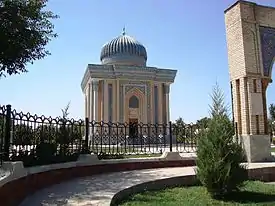Muhammad Rafi Usmani
Muhammad Rafi Usmāni (born 21 July 1936) is a Pakistani Muslim scholar, jurist and author who serves as the President of Darul Uloom Karachi. He was named Pakistan's Grand Mufti.[1]
Muhammad Rafi' 'Usmani | |
|---|---|
| 3rd President of Darul Uloom Karachi | |
| Assumed office 27 March 1986 | |
| Preceded by | Abdul Hai Arifi |
| 2nd Mufti of Darul Uloom Karachi | |
| Assumed office 1976 | |
| Preceded by | Muhammad Shafi Deobandi |
| Personal details | |
| Born | 21 July 1936 Deoband, United Provinces, British India |
| Relations | Muhammad Taqi Usmani (brother), Usmani family of Deoband |
| Father | Muhammad Shafi Deobandi |
| Alma mater | Darul Uloom Deoband, University of the Punjab, Darul Uloom Karachi |
| Personal | |
| Religion | Islam |
| Denomination | Sunni |
| Jurisprudence | Hanafi |
| Creed | Maturidi |
| Movement | Deobandi |
Born in 1936 in Deoband to Muhammad Shafi Deobandi, Usmāni is an alumnus of Darul Uloom Deoband, University of the Punjab and the Darul Uloom Karachi. He has authored books including Ahkām-e-Zakāt, Al-Tālīqāt al-nāfi'ah alā fath al-mulhim, Islām mai aurat ki hukmrāni and Nawādir al-Fiqh. He is a syndicate member of the University of Karachi, and a member of the executive council of Wifaq ul Madaris Al-Arabia. He is the elder brother of Muhammad Taqi Usmani.
Background and early life
Muhammad Rafi Usmāni was born on 21 July 1936 in Deoband, United Provinces.[2] He is the elder brother of Muhammad Taqi Usmani. They are the sons of Muhammad Shafi Usmani, the founder of Darul Uloom Karachi.[3]
Education
Muhammad Rafi Usmāni memorized half of the Quran at Darul Uloom Deoband, and migrated to Pakistan on 1 May 1948, and completed memorizing the Quran in Pakistan.[4] In 1378 AH, he passed the "molvi" and "munshi" examinations from University of the Punjab.[4] Usmāni graduated in the traditional "dars-e-nizami" from Darul Uloom Karachi in 1959.[4] He specialized in Islamic jurisprudence (ifta) at Darul Uloom Karachi in 1960.[4]
Usmāni studied Sahih Bukhari with Rashid Ahmed Ludhianvi, Sahih Muslim with Akbar Ali Saharanpuri, Muwatta Imam Muhammad and Sunan Nasai with Sahban Mehmood, Sunan Abu Dawood with Ri'ā'yatullah and Jami' al-Tirmidhi with Saleemullah Khan.[5] He studied parts of Sunan ibn Majah with Muhammad Haqīq, and completed studying it under the tutelage of Ri'ā'yatullah.[5]
Usmāni is authorized to transmit hadith by Hasan bin Muhammad al-Musyath, Muhammad Idris Kandhlawi, Muhammad Shafi Deobandi, Muhammad Tayyib Qasmi, Muhammad Zakariyya Kandhlawi and Zafar Ahmad Usmani.[6]
Career
Usmāni has been a member of All Pakistan Ulema Council, Council of Islamic Ideology, Ruet-e-Hilal Committee and Zakat Council of the Government of Sindh.[7] He was an advisor to Shariat Appellate Bench, Supreme Court of Pakistan.[7] He served as a member of the examinations committee of Wifaq ul Madaris Al-Arabia.[7] Usmani was a syndicate member of the NED University of Engineering & Technology.[7]He is a syndicate member of the University of Karachi, and a member of the executive council of Wifaq ul Madaris Al-Arabia.[8]
Usmāni succeeded Abdul Hai Arifi as the president of Darul Uloom Karachi. At Darul Uloom Karachi, Usmāni taught all the books related to "dars-e-nizami" from 1380 AH to 1390 AH. Since 1391 AH, he has been teaching the sciences of "hadith" and "ifta" in the seminary.[9] He teaches Sahih Muslim in the Darul Uloom Karachi, and trains the students of Islamic jurisprudence.[10]
He always asked students to keep a distance from politics.[11]
Literary works
Usmāni has authored about 27 books in Arabic and Urdu.[12] His books include:[12]
- Ahkām-e-Zakāt
- Alāmāt-i qiyāmat aur nuzūl-i Masīḥ
- Al-Tālīqāt al-nāfi'ah alā fath al-mulhim
- Bai al-wafā
- Europe ke tīn mu'āshi nizām, jāgīrdāri, sarmāyadāri, ishtirākiyat awr unka tārikhi pas-e-manzar. Its English translation is published separately as The three systems of economics in Europe: feudalism, capitalism, socialism and their historical background.
- Ilm al-Sīgha, This book is taught in the "dars-e-nizami" curiculum in the madrasas of India, Pakistan, Bangladesh, England, South Africa and United States of America.
- Islām mai aurat ki hukmrāni
- Ḥayāt-i Muftī-yi Aʻẓam
- Kitābat-e-Hadees ahd-e-risālat o ahd-e-sahāba mai
- Mere murshid Ḥaẓrat-i ʻĀrifī
- Nawādir al-Fiqh
References
- Mufti Ikram Ul Haq (2014). Companion of Hajj. Xlibris Corporation. p. 11. ISBN 9781493166374.
- Usmani, Muhammad Rafi, "Kuchh Mu'allif ke bāre mai (Something about the author) by Asmatullah", Nawādir al-Fiqh, 1, p. 11
- "Mufti Taqi Usmani survives assassination attempt in Karachi". Dawn (newspaper). 22 March 2019. Retrieved 12 March 2020.
- Usmani, Muhammad Rafi, "Kuchh Mu'allif ke bāre mai (Something about the author) by Asmatullah", Nawādir al-Fiqh, 1, p. 12
- Usmani, Muhammad Rafi, "Kuchh Mu'allif ke bāre mai (Something about the author) by Asmatullah", Nawādir al-Fiqh, 1, p. 20
- Usmani, Muhammad Rafi, "Kuchh Mu'allif ke bāre mai (Something about the author) by Asmatullah", Nawādir al-Fiqh, 1, p. 20–21
- Usmani, Muhammad Rafi, "Kuchh Mu'allif ke bāre mai (Something about the author) by Asmatullah", Nawādir al-Fiqh, 1, p. 15
- Usmani, Muhammad Rafi, "Kuchh Mu'allif ke bāre mai (Something about the author) by Asmatullah", Nawādir al-Fiqh, 1, p. 13
- Usmani, Muhammad Rafi, "Kuchh Mu'allif ke bāre mai (Something about the author) by Asmatullah", Nawādir al-Fiqh, 1, pp. 14–15
- Usmani, Muhammad Rafi, "Kuchh Mu'allif ke bāre mai (Something about the author) by Asmatullah", Nawādir al-Fiqh, 1, p. 12
- "مفتی رفیع عثمانی کی مدارس کے طلبہ کو سیاست سے دور رہنے کی تلقین". jang.com.pk. Retrieved 13 March 2020.
- Usmani, Muhammad Rafi, "Kuchh Mu'allif ke bāre mai (Something about the author) by Asmatullah", Nawādir al-Fiqh, 1, pp. 16–17
Bibliography
- Muhammad Rafi Usmani. "Kuchh Mu'allif ke bāre mai (Something about the author) by Asmatullah". Nawādir al-Fiqh. 1. Karachi: Maktabah Darul Uloom Karachi. p. 11-21.
External links
- Blackwater involved in Karachi catastrophe, says Mufti Usmani (Muharram 2009 blasts in Karachi) Geo TV News, Published 30 December 2009, Retrieved 13 March 2020
